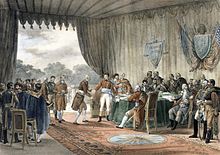1800 in the United States
Appearance
| |||||
| Decades: | |||||
|---|---|---|---|---|---|
| See also: | |||||
| 1800 in the United States |
| 1800 in U.S. states |
|---|
| States |
|
|
| Washington, D.C. |
| List of years in the United States by state or territory |
Events from the year 1800 in the United States.
Incumbents
[edit]- President: John Adams (F-Massachusetts)
- Vice President: Thomas Jefferson (DR-Virginia)
- Chief Justice: Oliver Ellsworth (Connecticut)
- Speaker of the House of Representatives: Theodore Sedgwick (F-Massachusetts)
- Congress: 6th
Demographics
[edit]Events
[edit]
- January 7 – The Virginia General Assembly adopts the Report of 1800, a resolution drafted by James Madison arguing for the sovereignty of the individual states under the United States Constitution and against the Alien and Sedition Acts.
- April – Voting begins in the 1800 United States presidential election; it will last until October. The result is not announced until February 1801.
- April 24 – The U.S. Library of Congress is founded.
- May 7 – Indiana Territory is formed by an Act of Congress as the first new territory created from the lands of the Northwest Territory.
- May 21 – President John Adams issues general amnesty for the Pennsylvania Dutch farmers who participated in Fries's Rebellion.
- July 4 – Indiana Territory is effective.
- July 10 – Connecticut cedes its Western Reserve (a strip in present-day northeastern Ohio) to the federal government, which adds it to the Northwest Territory.
- August 4 – The 2nd United States Census is conducted. It finds 5,308,483 people living in the U.S. of which 893,602 are slaves.
- August 30 – Gabriel Prosser's slave revolt in Richmond, Virginia is postponed due to weather. Word of his plan reaches Virginia's governor, James Monroe, who calls in the state militia. Gabriel is later captured and hanged on October 10 along with 23 other slaves.
- September 30 – The Convention of 1800, or Treaty of Mortefontaine, is signed between France and the United States of America, ending the Quasi-War.
- October 1 – In the Third Treaty of San Ildefonso, Spain returns Louisiana to France.
- November 1
- U.S. President John Adams becomes the first president of the United States to live in the Executive Mansion (later renamed the White House).
- Middlebury College is granted its charter by the Vermont General Assembly.
- November 17 – The U.S. Congress holds its first Washington, D.C. session.
Ongoing
[edit]- Quasi-War (1798–1800)
- Presidency of John Adams (March 4, 1797 – March 4, 1801)
Publications
[edit]- "Parson" Weems' A History of the Life and Death, Virtues and Exploits of General George Washington.
- William Russell Birch's Birch's Views of Philadelphia
Births
[edit]
- January 7 – Millard Fillmore, 13th president of the United States from 1850 till 1853, 12th vice president of the United States from 1849 till 1850. (died in 1874)
- February 14 – Emory Washburn, 22nd Governor of Massachusetts (died 1877)
- February 21 – John H. Winder, career United States Army officer, later Confederate general officer (died 1865)
- February 26 – Lucius Lyon, United States Senator from Michigan from 1843 till 1845. (died 1851)
- March 14 – James Bogardus, inventor and architect (died 1874)
- May 9 – John Brown, abolitionist (died 1859)
- July 15 – Sidney Breese, United States Senator from Illinois from 1843 till 1849. (died 1878)
- August 6 – Catharine Beecher, educator (died 1878)
- August 21 – Hiram Walden, United States Representative from New York (died 1880)
- August 22 – William S. Harney, United States Army Brigadier General (died 1889)
- September 11 – Daniel S. Dickinson, United States Senator from New York (died 1866)
- October 2 – Nat Turner, leader of slave rebellion (died 1831)
- October 3 – George Bancroft, historian (died 1891)
- October 27 – Benjamin Wade, United States Senator from Ohio (died 1878)
- October 30 – David Meriwether, United States Senator from Kentucky in 1852. (died 1893)
- December 29 – Charles Goodyear, inventor (died 1860)
- Eliza Seymour Lee, pastry chef and restaurateur (died 1874)
Deaths
[edit]This section needs expansion. You can help by adding to it. (November 2011) |
- January 13 – Dempsey Burges, Republican U.S. Congressman from North Carolina (born 1751)
- January 20 – Thomas Mifflin major general in the Continental Army, President of the Continental Congress, signatory of the Continental Association (born 1744)
- January 23 – Edward Rutledge, statesman (born 1749)
- February 2 – James C. Jarvis, United States Navy officer (born 1787)
- March 21 – William Blount, politician (born 1749)
- July 23 – John Rutledge, 2nd Chief Justice of the United States (born 1739)
- August 24 – Rawlins Lowndes, lawyer and jurist (born 1721)
- August 27 – John Barnwell, soldier and public official (born 1748)
- August 31 – John Blair Jr., American Founding Father (born 1732)
- September 26 – William Billings, choral composer (1746)
- October 7 – Henry Babcock, colonial American military officer (born 1736)
- October 10 – Gabriel Prosser, slave revolt leader (born 1776)
- October 28 – Artemas Ward, Major General of the Continental Army and politician (born 1727)
- November 30 – Charles Adams, second son of John Adams, the 2nd president of the United States (born 1770)
- December 17 – William Peery, farmer, and lawyer (born 1743)
- Chief Blackbird, Omaha leader (born c. 1750)
See also
[edit]External links
[edit] Media related to 1800 in the United States at Wikimedia Commons
Media related to 1800 in the United States at Wikimedia Commons

